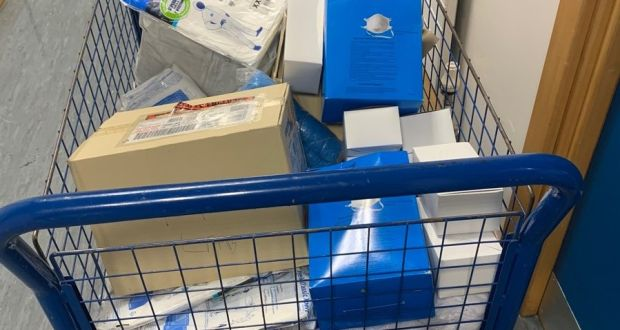31/03/2020

Researchers in Ireland are donating time, expertise and equipment to the frontline efforts in the Covid-19 pandemic.
“Everyone wants to help” is the common refrain in the research community, and one that is prompting creativity and innovative thinking from scientists who are donating time, materials and equipment to support those at frontline in responding to coronavirus.
Tracing contacts
At Dublin City University (DCU), the response has been enormous, says Dr Mary Rose Sweeney, head of the School of Nursing, Psychotherapy and Community Health.
DCU has set up and established a call centre for contact tracing, where volunteer staff from the university make calls to people to let them know that they have tested positive for the new coronavirus, find out who may have been exposed to it and then follow up calls with those individuals.
“It came about when we got a call from University College Dublin, who were developing the training materials for contact tracing and setting up their own call centre. They initially asked if we had the capacity to help with training,” Sweeney adds.
“Then we realised that as well as training, we could also set up a hub here in DCU – we had the facilities and the space so we could put distance between the volunteers as they were working.”
The call for volunteers has been answered from across the university, she points out. “As lecturers and researchers we are really busy keeping lectures going online and making sure the students and research teams are doing well in this new way of working. So the people who are volunteering are doing this in addition to their day jobs, they are doing it for the national cause.”
Many lab-based researchers have also been looking at how they can help with practical supplies. Prof Padraic Fallon loaded a trolley full of gloves, masks, aprons and protective suits from his now-closed lab in Trinity College Dublin and got them to St James’s Hospital, where they can help to protect clinical workers as they care for patients.
Prof Fallon, who is professor of translational immunology, researches lung inflammatory lung diseases. He has now switched his focus to working from home, planning new research with international colleagues on addressing lung inflammation as it relates to Covid-19.
“From talking to medical colleagues at St James’s, I knew they needed personal protective equipment or PPE,” he says. “I realised our lab had all these items that could be of use, and we would not need them for some time. So rather than have it sitting on the shelves, I got it over to them.”
Matching resources
Physician Prof Derek O’Keeffe is now trying to make similar matches between people who have PPE and other important supplies and those who need them.
“I have colleagues around the world who have been involved in the fight against Covid-19, and I could see that unfortunately in times of a surge, healthcare systems get overwhelmed and there may not be enough protective clothing like gloves and aprons,” adds Prof O’Keeffe, who is professor of medical device technology at NUI Galway and a consultant endocrinologist at Galway University Hospitals.
“Then I also had people from industry ringing up saying they had boxes of gloves or other protective equipment, and asking how they could help,” he adds.
Prof O’Keeffe worked with Dr Kevin Johnson from the University of Limerick to create a website called covidmedsupply.org that can connect clinicians with local supplies as needed. “A lot of people working in different industries, like the pharmaceutical sector or hairdressers or catering or construction, will have protective clothing and equipment.
They can go onto the website and give details about where they are, in general the kinds of equipment they have and the details of a contact person,” explains Prof O’Keeffe. “Then when someone needs this equipment, they can go online and see what is available in their area. Everyone wants to help, trying to find that match is the issue, and that is what we are looking to do.”
Scientists on call
Dr James Reynolds has also gone online to help scientists find out how they can apply their skills to slow Covid-19. A neuroscientist who works at University College London, he had come home to Ireland when the university was closing, and he and fellow scientists were keeping in touch about how they could apply their skills to help.
“We started out with a WhatsApp group, and we could see that a lot of scientists wanted to help, but were not sure where to direct their efforts,” he says. “So we made a website (irishscientistsoncall.com) where we can post information about the skills or materials that are needed, and people can join a mailing list to keep updated.”